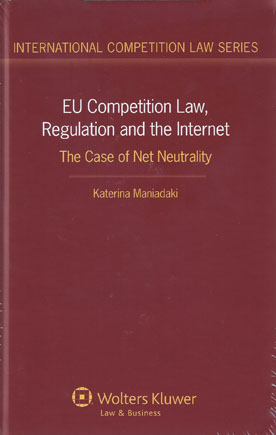EU Competition Law, Regulation and the Internet: The Case of Net Neutrality
ISBN13: 9789041141408
Published: November 2014
Publisher: Kluwer Law International
Country of Publication: The Netherlands
Format: Hardback
Despatched in 10 to 12 days.
This thorough analysis of the subject of Net Neutrality demonstrates that, irrespective of how the EU sector-specific framework on NN develops, competition law remains one of the tools – in some cases the only tool – available to regulators in order to address practices that might result in the unequal treatment of Internet content.
What can EU competition law, and in particular the prohibition of TFEU Article 102, contribute to the preservation of net neutrality? The author clearly identifies the issues that this question gives rise to and discusses the principles under which they should be addressed.
She critically discusses the standards set by the existing case law and introduces a framework for the relevant market definition and the assessment of market power in markets where NN violations could manifest. The issues and topics examined include the following:-
- interconnection agreements among operators;
- serving end-users vs. serving high-volume content providers;
- content delivery networks;
- quality of service guarantees;
- traffic management mechanisms;
- effects of rivalrous consumption;
- operators’ preferential treatment of specific types of data (e.g., streaming);
- active interference with Internet subscribers’ online file-sharing;
- capacity planning and provisioning;
- application of the antitrust doctrines on refusals to deal, non-discrimination, and unfair trading;
- incentives of market players to invest and innovate; and
- determining evidence of operators’ discriminatory behaviour.
The analysis emphasizes the case law of the CoJ, Commission decisions, and soft-law instruments, and also attends to decisions under Article 7 of the Framework Directive and relevant policy documents, including work by the Body of European Regulators (BEREC). Concerning as it does a topic that is fiercely debated at the academic, legislative, industry and societal levels – a very polarized controversy over what many speak of as nothing less than the ‘future of the Internet’ – this book sheds clear light on what the NN debate is about and how it has been dealt with under EU law.
